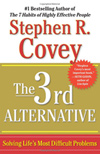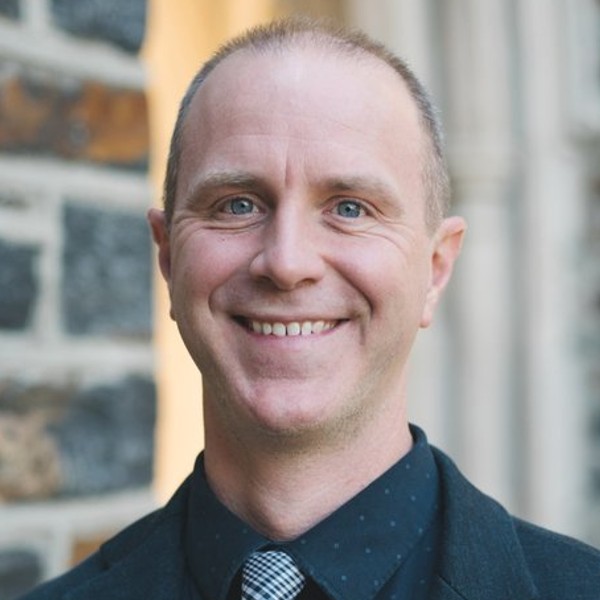Updated: Stephen R. Covey died on July 16, 2012.
When people with opposing opinions collide, one side typically wins out, while the other leaves frustrated and angry.
But there’s a way to resolve differences that results in less conflict and leaves both parties enthusiastic about the outcome, said Breck England, co-author of Stephen Covey’s new book, “The 3rd Alternative.”
 In the book, the authors encourage individuals in leadership positions to listen to both sides of a problem and look for answers that transcend polarizing positions.
In the book, the authors encourage individuals in leadership positions to listen to both sides of a problem and look for answers that transcend polarizing positions.
“It’s a question of mindset,” said England, who holds a doctoral degree in English and works as a consultant for the FranklinCovey Co., focused on Covey’s principle-centered theories of organization and leadership.
“If you approach a problem with the point of view that ‘I’m interested in an exciting third alternative; I don’t care where it comes from,’ then the burden comes off of you. It’s so liberating for a leader to be able to say, ‘I don’t have to be the source of this,’” he said.
Covey, a worldwide expert in business and personal time management, teaches at Brigham Young University but is best known for his book “The 7 Habits of Highly Effective People,” along with other books about organizational leadership.
England spoke to Faith & Leadership about the latest book and the steps to finding better solutions to organizational dilemmas. The following is an edited transcript.
Q: Could you describe the concept behind “The 3rd Alternative”?
In just about any field of human endeavor, you’ll have two conventional alternatives -- left versus right, management versus labor. The idea behind “The 3rd Alternative” is to arrive at a position that is better -- that is higher -- than either of those two conventional alternatives.
Dr. Covey was taken with this idea years ago when he studied some of the literature on leadership and learned that many of the great leaders get beyond the conventional two sides of a story to a third side, which is new, innovative and better than anyone thought of before.
So the idea behind the book was that many of our conflicts, and also dilemmas that we face in life, are often the products of poor thinking. A better way to think is to look for a third alternative.
Q: How is it different from compromise?
It’s the opposite of compromise. In a compromise, everyone loses something. When you get into a compromise situation, people tend to go away generally unsatisfied. They didn’t get what they wanted. They had to cede ground to the other party.
The idea behind “The 3rd Alternative” is actually the opposite of that. It’s that no one gives anything up, because we arrive at something that everybody agrees is a win for everyone. It’s something better than any of us thought of before. It’s something that delights everyone.
Q: How does this book build on Stephen Covey’s classic book “The 7 Habits of Highly Effective People”?
The “7 Habits” book is based on the idea that if you start by realizing that you are responsible for your own choices, you begin to rise in maturity through a series of seven habits. The final and culminating of what he calls “interpersonal” habits is Habit 6, which is “Synergize.”
Synergy, he believes, is the highest human activity. In any interactive situation, it’s possible to arrive at a synergistic solution that is better than anyone has thought of before. So he would say that the “7 Habits” book leads up to this book.
Q: Could you talk about the mindsets that make it difficult to find that third alternative?
I can take a concrete example and walk you through it. Malaria is endemic in equatorial Africa. For years there has been a knock-down, drag-out argument between the left and the right about what to do about it.
Years ago, there was a solution in the form of DDT, which was very effective at wiping out the mosquito that causes malaria, but it was very damaging to wildlife. So for many years the use of DDT was banned, because it was damaging to wildlife. But then malaria came roaring back, of course.
So the right wing would like to see DDT brought back, for a number of reasons. They feel that the threat is overblown. And the left wing comes back and says, “This is far more damaging than you think it is.”
There’s this tremendous tug of war between them.
Our contention is that they’re both equally caught in conventional thinking and they’re unable to get past it.
While the left and the right wings are fighting over DDT, along comes Nathan Myhrvold and his fabulous Intellectual Ventures company in Seattle. And they come up with a thousand “third alternatives” for curing malaria.
Some of them are really off-the-wall, like a machine that will shoot down mosquitoes.
With less than $200 worth of equipment -- a little blue laser, the kind that they use in the grocery store checkout, a computer and a radar system -- they put this system in place in the perimeter fence around a village and program the computer so that it can distinguish the female Anopheles mosquito.
As the female mosquito enters the perimeter, a laser beam shoots it down. And the laser that shoots the little mosquito out of the sky will not hurt any other form of life.
Q: Is it the emotional investment that makes these disputes difficult to resolve?
Yes, there’s a deep emotional investment in one’s own side and one’s own position and one’s own philosophy.
Why do people find it so difficult to get past these conventional ways of thinking? We believe the reason is because they emotionally identify with their positions to the point where they can’t get beyond them.
Q: So what are the personal skills and habits that people can learn in order to practice this kind of thinking?
What you need to do is recognize that there is an abundance of solutions.
In logic, there’s never only one alternative to anything. There may be infinite alternatives.
For example, the struggle over energy philosophies in this country is a deeply political, and therefore deeply psychological and emotional, conflict. The fact is, the universe is absolutely roaring with energy. There is no energy shortage. There is simply a shortage of solutions.
In India there are millions of houses without electricity. The leftist politicians want a national electricity grid paid for by the government. And there are private interests who say a national electricity grid should be privately owned. The result is you get a 40-year battle between these two sides and no solution.
Then what happened was that a little company owned by a man named Harish Hande slips in between the two and says, “We don’t need a national electricity grid.” So he’s producing kits that will enable these homes to be electrified by solar power for less than $200, and millions of homes in India are rapidly being electrified by these little kits. Soon the argument over whether there should be a national electricity grid becomes irrelevant.
Harvard Business School Professor Clayton Christensen saw all these television sets running off of solar energy kits and said, “People don’t want a national electricity grid. What they want is a TV they can watch.” The national electricity grid is just one way to get there.
A second key to this kind of thinking is to have enough personal confidence to go up to people you disagree with and say -- and in sincerity -- “You disagree with me; I need to listen to you,” instead of saying, “You disagree with me; I need not to listen to you.”
If you really do sit and listen to the other side with the intent to understand them and understand their point of view and see if there’s anything of value there, that immediately diffuses the conflict.
A third thing you can do is say, “Would you be willing to look for an alternative that neither one of us has thought of before?”
Generally, they will say they are willing to do that. And as you push towards a better alternative and keep that goal in mind, you soon find yourselves transcending your positions. There’s no guarantee that you’ll arrive at it, but when you do, you’ll know you’ve got it. Everybody gets excited. They say things like, “I never thought of that before,” or, “Why didn’t we think of that before?” They recognize it when they get there.
Q: How can institutional leaders cultivate those skills and habits in their organizations?
My research and experience have shown me that to a very great extent, an institution is the reflection of the leader. Whether you’re the university president or the CEO, the leader sets the tone for the entire institution.
The key is to begin to model third-alternative thinking. Have third-alternative sessions if you’re facing a dilemma: “Do I need to raise money or not?” or, “Should we take money from this source or not?”
Whatever dilemma you’re facing, you start holding sessions where the goal is not to fight or argue points but to generate third alternatives. You can always argue later if you want.
A good place to start is by saying -- just say, “You differ from me; I need to listen to you.” And then just do it, without debating the point with them. The idea is to truly understand their position rather than to debate it.
Q: You wouldn’t allow people to start arguing over those points -- just present them to the group?
Yes. The idea behind letting people vent is that it gets it off their chest, and it kind of empties their conflict bank. It empties out their psychologically pent-up, repressed feelings. And then they’re often ready to sit back and think with you.
Here’s another story: One little pizza store in a chain was producing so much more revenue than the others that the company was interested in how the manager was doing it.
The only thing he does differently is bring together his crew once a week and hold what he calls a huddle. He lets them come up with the ideas, and it’s amazing how creative these teenagers can be.
They’ve come up with some outstanding ideas, like load a pickup truck with hot pizzas and drive them to the football game and sell them out of the truck.
They come up with these unconventional ways of selling. As a result, this man has a huge revenue stream compared to his competing stores, because he values the ideas of his people.
Think about that mindset in relation to running a huge organization like a university. You can see how energizing it could be if a university president were to get his vice presidents or his reports together and say to them, “What can we do this week we’ve never done before?”
Q: How do you apply this in situations where maybe there isn’t conflict, but you just think it’s a good way of thinking?
It applies to any dilemma that you face. So the idea is, if I’m a leader, I really value diverse points of view.
We all have slices of truth, I like to say. So it’s valuable to get as many slices of truth out on the table as you can, and take that terrible burden off the leader of trying to be the fount of all wisdom.
The idea behind “The 3rd Alternative” is the principle of synergy -- that you and I together can come up with things that one of us alone could never do. And those things will be far more fruitful than just the two of us together. One plus one equals three, or 10, or 1,000, instead of just two.
Q: You use words such as “excitement,” “promise” and “delight” to describe this concept -- not your typical business leadership language. What’s the significance of this?
Human beings are delighted by the exciting, new idea. It’s just part of our makeup. I think it’s the highest human endeavor, to discover new truths, to discover new ideas, to arrive at new realizations, to boldly go where no one has gone before. (I grew up with “Star Trek,” OK?)
I believe that’s rooted in us. And it’s our highest delight in life to discover something new that really works well and works better than we ever thought anything could work. Of course, we live in a world where we’re saturated with that.
The highest form of human work is coming up with the exciting new alternative that nobody thought of before.
We wrote the book because we were fascinated with all of the evidence of human ingenuity that can come once we get past our conventional, two-sided ways of thinking. The “me-against-you” thinking is the enemy of the future.
It’s a very hard thing to do, to get past your traditional mindsets.






